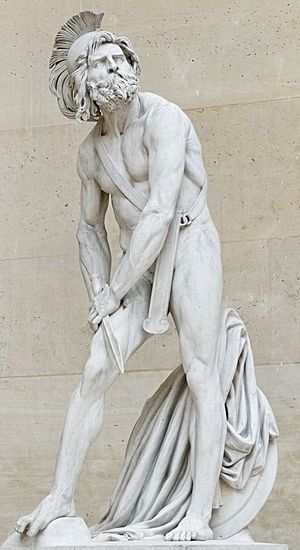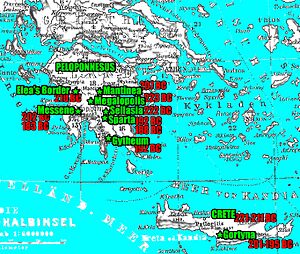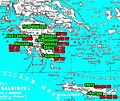Philopoemen facts for kids
Philopoemen (pronounced fil-oh-PEE-men; born 253 BC in Megalopolis – died 183 BC in Messene) was a very skilled Greek general and leader. He was chosen as the top general, called a strategos, for the Achaean League eight times.
From 209 BC, Philopoemen helped make the Achaean League a strong military power in Greece. A Roman once called him "the last of the Greeks," meaning he was the last great Greek leader.
Contents
- Philopoemen's Early Life and Training
- Defending Megalopolis: A Young Hero
- The Battle of Sellasia: A Key Victory
- Rising as a Cavalry Leader
- The Battle of Mantinea: A Great General
- Dealing with Nabis of Sparta
- Philopoemen's Time in Crete
- Philopoemen Returns as Strategos
- Sparta Joins the Achaean League
- Philopoemen's Last Years
- Images for kids
- See also
Philopoemen's Early Life and Training
Philopoemen's father, Craugis, died when Philopoemen was young. He was then adopted by Cleander, an important citizen of Megalopolis.
Philopoemen learned from philosophers named Ecdemus and Demophanes. These teachers had helped remove bad rulers, called tyrants, from cities. Because of them, Philopoemen learned to value freedom and democracy. He wanted to be like Epaminondas, a famous general from Thebes. Philopoemen believed that a public servant should always be honest and good. So, he wore simple clothes and avoided anything fancy his whole life.
Defending Megalopolis: A Young Hero
Philopoemen first became known when he helped defend his city, Megalopolis, in 223 BC. The Spartan king, Cleomenes III, had captured Megalopolis. Philopoemen was one of the first to fight back.
During the battle, Philopoemen lost his horse and was hurt. But he kept fighting until the very end. His brave actions gave the people of Megalopolis enough time to escape the city safely.
The Battle of Sellasia: A Key Victory
The king of Macedonia, Antigonus III Doson, wanted to bring Macedonian power back to Greece. In 224 BC, he made an alliance with the Achaeans and other Greek groups. Antigonus then invaded Greece and pushed the Spartans out of some cities.
When Antigonus moved towards Sparta, King Cleomenes had blocked most mountain passes. Cleomenes waited with his army near Sellasia.
Philopoemen led a group of cavalry (soldiers on horseback). He was also supported by soldiers from Illyria. When the Illyrian soldiers were surrounded by the enemy, Philopoemen attacked. His forces suffered losses, but the Spartans were surprised and ran away. Philopoemen's horse fell, and he was hit by a spear. Still, he kept fighting behind enemy lines.
In the end, the Macedonian army and their allies defeated the Spartans. Cleomenes had to escape to Egypt. Philopoemen's actions greatly impressed King Antigonus III.
Rising as a Cavalry Leader
After this, Philopoemen spent 10 years in Crete as a mercenary, a soldier who fights for money. He returned to Greece in 210 BC and was made the commander of the Achaean League's cavalry.
In the same year, during a war between Macedonia and Rome, Philopoemen faced an enemy leader named Damophantus. Damophantus charged directly at Philopoemen with his spear. Philopoemen bravely waited and then thrust his own spear into Damophantus, killing him. The enemy army immediately ran away. This made Philopoemen even more famous across Greece.
The Battle of Mantinea: A Great General
Philopoemen became the strategos (top general) of the Achaean League in 209 BC. He used his power to improve the Achaean army. He made their equipment better and updated their fighting methods.
His hard work paid off a few years later. After King Cleomenes III was defeated, Sparta had a new ruler named Machanidas.
The Battle of Mantinea happened in 207 BC. It was fought between the Spartans, led by Machanidas, and the Achaean League, led by Philopoemen. The Achaeans won a big victory. In the battle, Philopoemen fought and killed Machanidas himself. Later, the Achaeans put up a bronze statue at Delphi showing Philopoemen fighting Machanidas.
After this victory, Philopoemen captured the city of Tegea. He then marched his army all the way to the Eurotas River.
Dealing with Nabis of Sparta
After Machanidas died, a nobleman named Nabis took power in Sparta. Nabis soon became the new ruler. Under Nabis, Sparta continued to cause trouble for the Peloponnese.
In 205 BC, Philip V of Macedon made a peace treaty with Rome, ending the First Macedonian War. After this peace, Nabis went to war against the Achaean League. However, Philopoemen was able to force Nabis out of Messene.
Philopoemen was chosen as strategos again from 201 to 199 BC. In 201 BC, Nabis invaded and captured Messene. But Philopoemen's Achaean army made the Spartans retreat. Philopoemen defeated Nabis's forces at Tegea, stopping Nabis's plans for a while.
Philopoemen's Time in Crete
The city of Gortyna in Crete asked Philopoemen for help. So, in 199 BC, Philopoemen went back to Crete as a mercenary leader. The fighting there was more like guerrilla warfare, with small, surprise attacks. But Philopoemen's experience helped him defeat his enemies. He stayed in Crete for six years.
While Philopoemen was away, Nabis took advantage. He attacked Megalopolis for a long time. Nabis also got the important city of Argos from Philip V of Macedon. Nabis then joined the Romans, hoping to keep his new lands.
In 196 BC, a Roman general named Titus Quinctius Flamininus accused Nabis of being a tyrant. He took a city called Gythium and made Nabis give up Argos. After stopping Nabis, the Roman forces left Greece in 194 BC. With the Romans gone, the main powers in Greece were Macedonia, the Aetolians, the strong Achaean League, and a weaker Sparta. The Aetolians encouraged Nabis to try and get his old lands back.
Philopoemen Returns as Strategos
Philopoemen returned to Greece and was appointed strategos again in 193 BC. He was ready to lead the fight against Nabis.
In 192 BC, Nabis tried to take back the coast of Laconia. The Achaeans asked Rome for help. The Roman Senate sent a navy and an ambassador, Flamininus.
Philopoemen didn't wait for the Roman fleet. He led the Achaean army and navy towards Gythium. However, the Achaean navy was defeated by the Spartan navy. On land, Philopoemen couldn't defeat the Spartans outside Gythium and had to retreat.
When Philopoemen tried again in Laconia, Nabis ambushed his forces. But Philopoemen still managed to win against the Spartans. Philopoemen's plans to capture Sparta itself were put on hold when the Roman ambassador, Flamininus, arrived. Nabis then agreed to a temporary peace.
Sparta Joins the Achaean League
Nabis then asked the Aetolians for help. They sent 1,000 cavalry to Sparta. However, the Aetolians murdered Nabis and took over Sparta for a short time. The Aetolian soldiers started looting the city, but the people of Sparta fought back and forced them to leave.
Philopoemen used this chance to enter Sparta with his Achaean army. Now in control of Sparta, Philopoemen made Sparta become a member of the Achaean League.
Sparta joining the league created a problem: what to do with all the Spartans who had been sent away by previous rulers? Philopoemen only wanted to bring back those who would support the Achaean League. This meant he was very strict with Sparta's old ways.
In 188 BC, Philopoemen entered northern Laconia with his army and some Spartan exiles. His army tore down the wall that Nabis had built around Sparta. Philopoemen then gave citizenship back to the exiles. He also got rid of Sparta's old laws and education system, replacing them with Achaean laws. Sparta stopped being a major power in Greece, and the Achaean League became the strongest power in the Peloponnese.
Philopoemen's Last Years
Philopoemen's actions angered some people, even his supporters in Sparta. His opponents in Sparta asked the Roman Senate for help. Rome suggested solutions, but Philopoemen and his supporters refused them all. They argued that Rome had already agreed to the Achaean League's independence.
This strong stance against Sparta and Rome caused disagreements within the Achaean League. However, Philopoemen died before these issues were solved.
In 183 BC, a man named Dinocrates, who was against Philopoemen, encouraged Messene to rebel against the League. When Dinocrates said he would capture a place called Colonis, Philopoemen decided he had to stop the rebellion.
In the battle that followed, Philopoemen found himself behind enemy lines. His horse threw him, and he was captured by the Messeneans. He was then offered poison, which was seen as an honorable way to die back then.
When the Achaean League heard about his death, they joined forces to capture Messene.
After his death, Philopoemen's body was burned. At his public funeral, the historian Polybius carried the urn with Philopoemen's ashes. Polybius later wrote a book about Philopoemen's life. The writer Pausanias said that after Philopoemen died, "Greece ceased to bear good men."
Images for kids
See also
 In Spanish: Filopemén para niños
In Spanish: Filopemén para niños





